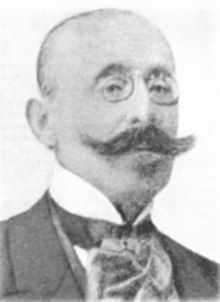Ksaver Šandor Gjalski
Ksaver Šandor Gjalski | |
|---|---|
 | |
| Born | Ljubomil Tito Josip Franjo Babić 26 October 1854 Gredice, Kingdom of Croatia, Austrian Empire (now Gredice, Croatia) |
| Died | 6 February 1935 (aged 80) Gredice, Kingdom of Serbs, Croats, and Slovenes (now Gredice, Croatia) |
| Occupation | novelist, civil servant |
| Language | Croatian |
| Notable work | Under Old Roofs |
| Spouse | Vilma Gönner |
Ljubomil Tito Josip Franjo Babić, better known by his pen name Ksaver Šandor Gjalski, (also cited as Đalski, both pronounced [d͡ʑǎlskiː]; 26 October 1854 – 6 February 1935)[1] was a Croatian novelist and civil servant.[2]
Biography
He was born in Gredice near Zabok in Hrvatsko Zagorje[1] into a minor aristocratic family. His father Tito was a feudal lord and lawyer who served as a representative in Sabor and was a strong supporter of the Croatian national revival. His mother Helena was the daughter of Franjo Ksaver Šandor Gjalski, also a feudal lord and lawyer, from whom Ljubomil took his pen name in 1884. His mother was also a relative of the Croatian poet Antun Mihanović.[1] He finished gymnasium in Varaždin in 1871 and went on to study law in Zagreb between 1871 and 1873 before finishing his studies in Vienna[3] in 1876, before finally passing the national exam in 1878.[1] In 1880, he moved to Virovitica, where he met his future wife, Vilma Gönner, a teacher at the local girls' school.[1] He served the royal government in Zagreb between 1891 and 1898, but, due to disagreements with the Khuen government, returned to Gredice.[1]
Gjalski, however, remained involved in politics. In 1906, he was elected into the Sabor, aligning himself with the Croat-Serb Coalition. From 1917 to 1918, he held the post of župan of the Zagreb County.[2] Between 1919 and 1920, he served as a member of the Provisional National Representation in the newly formed Kingdom of Yugoslavia in Belgrade, retiring at the end of 1920.[1] He served twice as the president of the Croatian Writers' Association (1909-1918, 1926)[1]
Gjalski wrote many novels, but his best known work is Under Old Roofs (Croatian: Pod starim krovovima), a collection of short stories in which he described the economic decline of the Croatian aristocracy.[2] His writings were heavily inspired by Turgenev and Šenoa, as well as realism and romanticism in general.[2]
Major works
- In the New Castle (Croatian: U novom dvoru, 1885)
- Under Old Roofs (Croatian: Pod starim krovovima, 1886)
- At Night (Croatian: U noći, 1887)
- Janko Borislavić (1887)
- Đurđica Agićeva (1889)
- Na rođenoj grudi (1890)
- Dawn (Croatian: Osvit, 1892)
- Radmilović (1894)
- For the Maternal Word (Croatian: Za materinsku rieč, 1902)
- Arrival of the Croats (Croatian: Dolazak Hrvata, 1924)
- Misappropriated Ideals (Croatian: Pronevjereni ideali, 1925)
References
- ^ a b c d e f g h Duda, Dean (1998). "GJALSKI, Ksaver Šandor". Hrvatski biografski leksikon. Zagreb: Leksikografski zavod Miroslav Krleža. Retrieved 17 November 2023. Cite error: The named reference "leks" was defined multiple times with different content (see the help page).
- ^ a b c d "Gjalski, Ksaver Šandor" (in Croatian). Miroslav Krleža Institute of Lexicography. Retrieved 30 April 2014.
- ^ Milorad Živančević (1971). Živan Milisavac (ed.). Jugoslovenski književni leksikon [Yugoslav Literary Lexicon] (in Serbo-Croatian). Novi Sad (SAP Vojvodina, SR Serbia): Matica srpska. pp. 113–114.
